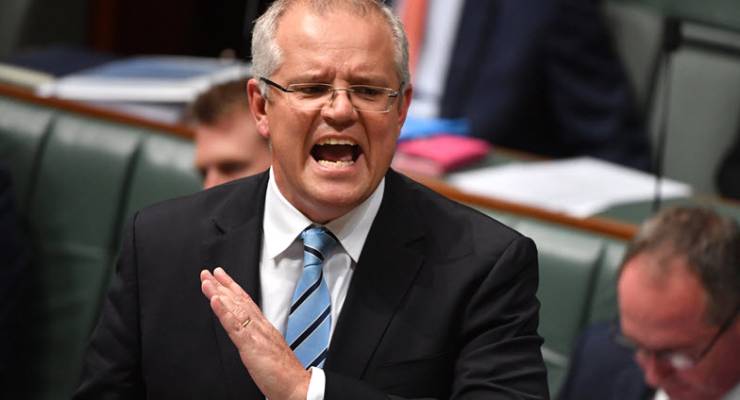
Recent trend data from the Edelman Trust Barometer series suggests Australia, along with some other western democracies, is becoming a low-trust society in regard to its major institutions — especially its politicians and the media. This has potential ramifications for economic growth, which is stronger in high-trust societies where complex social and legal mechanisms aren’t needed to ensure basic transactions and contracts work.
There are non-economic consequences, however, that seem to accompany the diminution of trust. A 2010 study of a number of different countries found that low levels of trust tended to encourage demand for greater economic intervention by government:
Distrust fuels support for government control over the economy. Consistent with the model’s predictions, distrust generates demand for regulation even when people realise that the government is corrupt and ineffective; they prefer state control to unbridled activity by uncivic entrepreneurs.
The conclusions, which alarmed libertarians, seem borne out to an extent in recent Australian political history: diminishing levels of trust in government here has occurred at the same time political pressure for greater regulation and more government intervention have prompted the major parties to adjust their policies significantly in areas like energy. Worse, the authors argue that increased regulation leads to decreasing trust — partly because greater regulation provides greater opportunities for corruption (and anti-competitive behaviour of the kind that was rampant in the Australia of the pre-reform era).
In some cases, increased regulation can itself become a vicious circle: even well-intentioned and sound regulation can, by increasing costs for industry, make smaller companies in an industry less competitive compared to larger companies that have greater capacity to absorb additional costs. This strengthens the market power of larger companies, giving them greater capacity to behave anti-competitively and gouge customers.
[Crisis in trust a product of governments too busy helping companies to help us]
Low trust levels are also, according to a 2015 US paper, strongly associated with willingness to believe conspiracy theories among both progressives and conservatives, although among the former, high levels of information tend to reduce belief in conspiracies. This, again, seems to tally with the recent Australian experience, in which falling levels of trust have been accompanied by the emergence of conspiracy theories even among mainstream party politicians about Muslims, vaccination, fluoride, the United Nations, and the re-emergence of anti-Semitic conspiracy theories among right-wing parties.
Conspiracy theories, of course, don’t do anything to reduce the partisanship of politics. Indeed, in such an environment, bipartisanship becomes more akin to collaboration or, at best, appeasement of the sinister forces plotting against you.
As the experience of Trump demonstrates, a low-trust political environment can become self-reinforcing by luring into public life people for whom the truth is entirely irrelevant, who literally have no standards about what they say. In an environment where all politicians are regarded as liars, the best liar can be the most effective politician. Indeed, Trump, bizarrely, has a reputation among his own supporters for “saying what he thinks”. The most egregious liar in political history has thus, perversely, acquired a reputation for authenticity among at least one segment of the electorate.
Moreover, it increases the tendency of other politicians to lie by demonstrating the diminishing consequences for being shown to be lying. How different would Australia’s political environment be if Tony Abbott and Barnaby Joyce had not so egregiously lied about issues like the carbon price when in opposition? Perhaps Malcolm Turnbull would feel more constrained about his own lying. Perhaps Bill Shorten and Labor would have been more reluctant to deploy the Mediscare lie during the 2016 election. But from Labor’s point of view, given Abbott had lied with both enthusiasm and impunity, why should they have quibbled about their own deception? Indeed, political hardheads would have regarded it as a no-brainer.
But the environment degrades further with every lie. Just this week, Treasurer Scott Morrison has rejected out of hand the work of his own department, and, yesterday, of the Productivity Commission, because their views didn’t fit his political narrative. This is positively Trumpian, close to channelling Michael Gove’s notorious Brexit line “people have had enough of experts”. The result is a political process where mere assertion has the same validity as hard evidence.
All up, diminishing trust means a worse economy, bigger, more interventionist governments, more conspiracy theory stupidity — and a self-reinforcing culture of lying.








Crikey, Bernard, you are a depressing bloke. Is there no glimmer of hope? No thin feeble flicker of a brighter future for us? Picked a bad day to give up barbiturates, I suppose. Cheers, or not, M
Yet Crikey and a couple of other small media outlets are the ones who call the politicians out.
What major outlet has come close to the assessment of Turnbull as a PM as GR did yesterday? News Corp and Sky we accept this from but the blatant grovelling from Fairfax, ABC and Guardian and the conga line of Turnbull sycophants debase and degrade trust in the media’s integrity.
Without scrutiny the politicians can do and say whatever they wish, knowing they will not be held to account, in Turnbull’s case knowing that the liberal media will gather together to help with his reelection.
How can you trust any politicians (that we pay our $tax; for whom we vote, on what we know) who want us (their employer) kept from the truth; and their opinionated media flunkies-for-access quite happy to be complicit in that pursuit of the cultivation of ignorance – “editing news for our own good” – passing off opinion as news?
As for “he says what he thinks” a babbling moron does that.
Any particular reason BK failed to mention the most prolix, ubiquitous, deceitful and oleaginous liars on the political scene, the overpaid, duchessed stenographers?